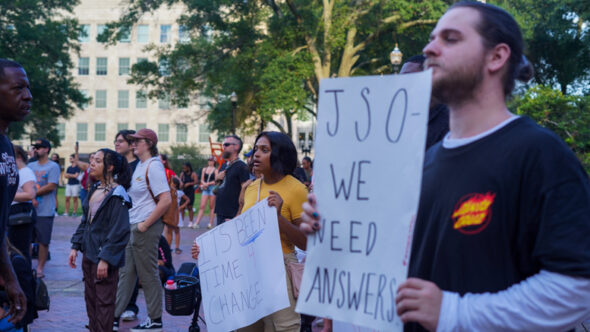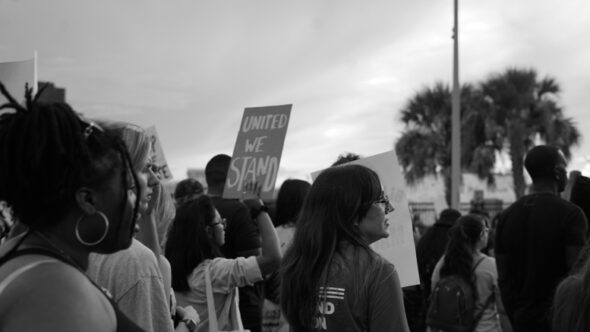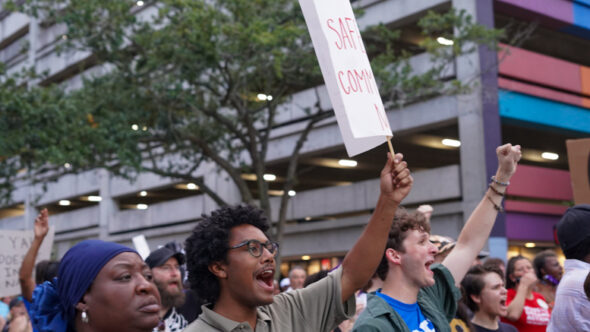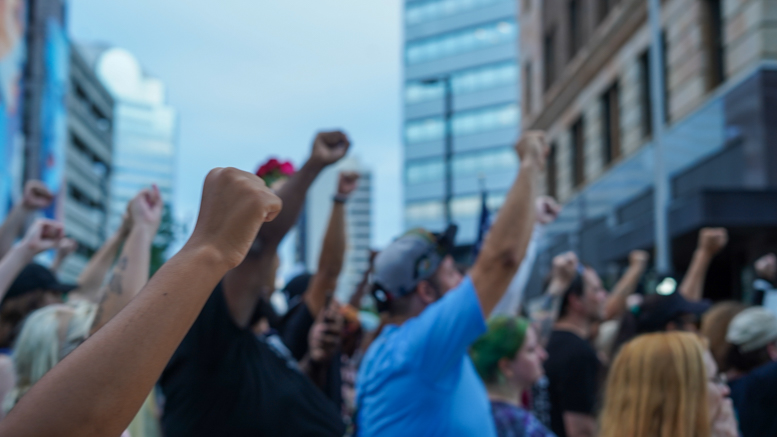By Hannah Duffey
Kanesha Fuller always feels a sense of pain and suffering when she sees headlines on the news of blacks shot by police or discrimination due to skin color.
But for the former president of Women’s March Jacksonville who has always advocated for equality, a racially-motivated shooting that killed three African-Americans at a North Florida Dollar General in August especially hit home.
“I mean, it’s been really hard to watch it happen in a place that you’re familiar with, where it could have been you,” Fuller said. “It’s a street you ride by. It’s a school you know about. It’s really sad.”
It is incidents like this that make Fuller realize why it is so critical to stand up for social justice issues, not just at the local level, but also nationally.
Police identified 21-year-old Ryan Palmeter as the Jacksonville shooter. Palmeter lived in Clay County with his parents and previously attended Flagler College in the Fall of 2020 before withdrawing in the spring of 2021. He took his own life in the Dollar General after shooting Angela Carr, AJ Laguerre and Jerrald Gallion, according to media reports.
Police said the shooting was racially-motivated and Palmeter, who was wearing a tactical vest and carried an “AR-15 style” rifle, also left racist writings along with swastika drawings on the weapon that was used.
“The way I feel about it in Jacksonville, I mean, obviously it’s super painful, but this is a feeling I had when this happened in Buffalo and this happened in Charleston,” Fuller said.
In a 2023 report conducted by Voice of America, following the shooting that happened in Jacksonville, “black people were the targets of more than one-fifth of all hate crimes reported in major U.S. cities last year, the highest share of any group.”

Like Fuller, Conor Naccarato has a mutual feeling and points out how people have been accustomed to the fact that blacks are being killed due to their skin color.
Naccarato recognizes that like police brutality, hate crimes against blacks have become so normalized that it is often overlooked.
“I grew up here and I remember thinking that gun violence especially was so normal. That it’s normal for there to be a shooting a block down the road,” Naccarato said. “It’s normal for a couple of people to die on the weekends, and then you move to other places, you talk to other people and they can’t even wrap their heads around living in that kind of violence.”
Along with the other protestors, Naccarato urged the Jacksonville Sheriff’s Office to help make the community a safer place, especially the black community because no one deserves to be killed due to the color of their skin.
“I always felt safe in here,” Violet Mayer said. “Nobody should have to feel unsafe because of their skin color or anything that is beyond their control.”
With so much being out of the hands of blacks, going to an historically black colleges and universities (HBCU) like Jacksonville’s Edward Waters University is something that they take pride in, and many young black kids have their eyes fixed on from a young age, especially if they grow up in a town where an HBCU is right around the corner.
After the Civil Rights movement, HBCUs gave blacks a chance to come together in an inclusive environment without the fear of judgment or danger.
The moment the Jacksonville gunman stepped foot onto the Edward Waters campus before going to the local Dollar General, it seemed as if part of their identity was taken away from them, and the place that was once their “safe place” no longer was.
This especially hit home for the families who live near Edward Waters because it is so close to home and that could have been them, Fuller said.

With a presidential election coming next year, protestors at a recent unity gathering urged the community to get out and vote for leaders in their community that will foster their ideas and let their voices be heard.
“I kind of think on the plus side of these unfortunate events is that I feel like this is going to light a fire under people to vote because next year is an election year,” Reggie Agulto said.
After hearing powerful words from local activists, the community came together to march through the streets of Jacksonville.
Protestors young and old, black and white, all came together in unity to publicly express their concerns about social injustice and what this means moving forward for the city of Jacksonville.

They say this difficult crossroad is not going to stop them from advocating for social change, as well as providing resources for black individuals to feel safe and heard.
As one of the speakers said quoting Zora Neale Hurston: “If you are silent about your pain, they will kill you and think you enjoyed it.”



Be the first to comment on "Jacksonville community comes together in Unity following mass shooting"